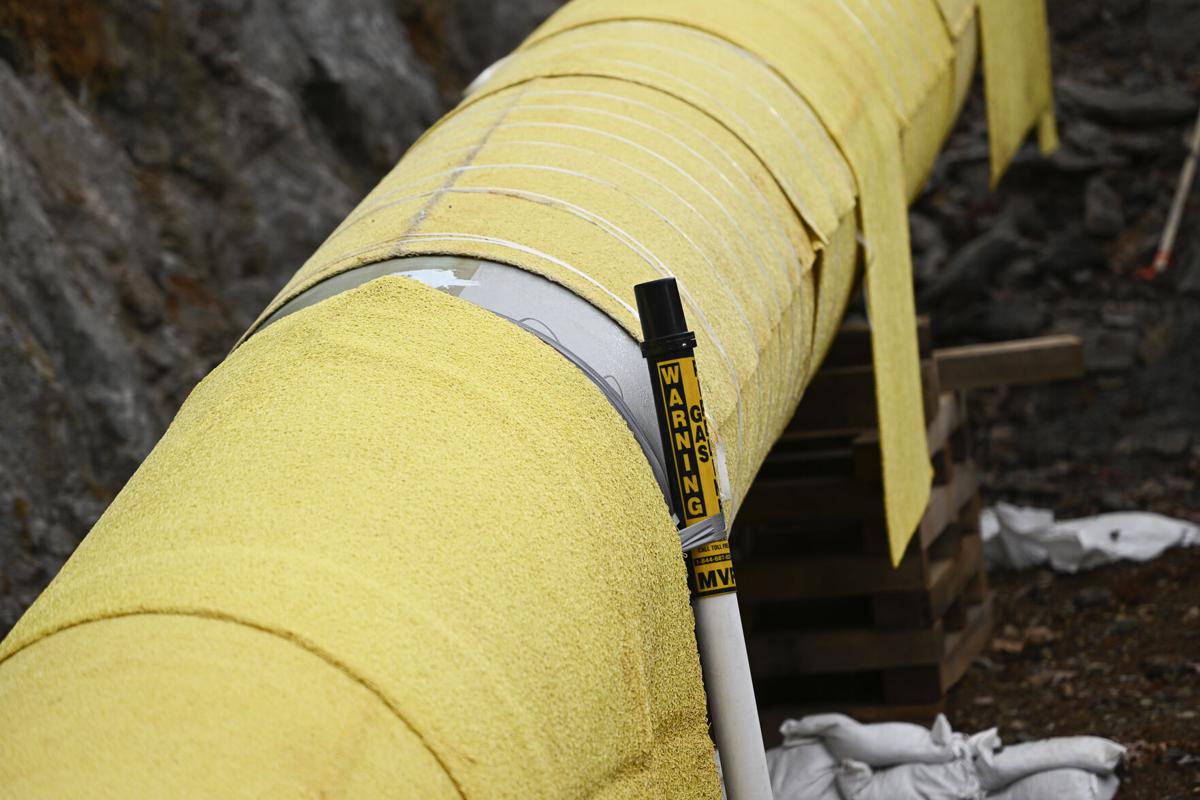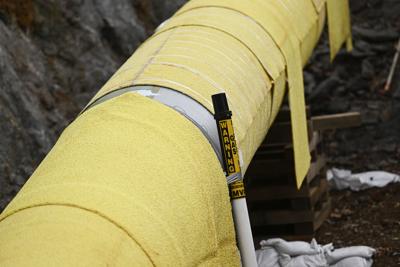The Mountain Valley Pipeline was authorized Tuesday to begin operations, the final step in a bitter, decade-long battle between natural gas advocates and opponents.
Approval of the deeply controversial project was granted in a one-page letter released shortly after 5 p.m. by the Federal Energy Regulatory Commission.
“We find that Mountain Valley has adequately stabilized the areas disturbed by construction and that restoration and stabilization of the construction work area is proceeding satisfactorily,” Terry Turpin, director of the commission’s Office of Energy Projects, wrote in the letter.
A Mountain Valley spokeswoman said the company was pleased with FERC’s approval. “Final preparations are underway to begin commercial operations,” Natalie Cox wrote in an email – while not saying when natural gas will begin flowing through the 303-mile pipeline.
People are also reading…
Mountain Valley and its supporters say the $7.85 billion project will bolster the country’s energy supply and security by transporting up to 2 billion cubic feet of natural gas per day from Appalachian shale formations to markets along the East Coast.
Opponents say the buried, 42-inch diameter steel pipe has carved a path of environmental destruction through West Virginia and Southwest Virginia since construction began in 2018.
More recently, after sections of pipe sat exposed to the elements for years while work was delayed by court fights, concerns turned to possible safety risks posed by damaged pipe being buried along steep and unstable mountain slopes.
FERC’s approval is “yet another in a long and continuous line of irresponsible decisions by a federal agency that is supposed to protect and promote the public good, not favor corporations running over the rights and interests of communities for profit,” said David Sligh, conservation director of Wild Virginia.
Jessica Sims, Virginia field director for Appalachian Voices, another group that has fought the pipeline, added:
“Since developers first proposed the ruinous Mountain Valley Pipeline, their disregard for community and environmental safety has been clear,” she said. “Community members and environmental watchdogs have pointed out the flaws in this project for years, and these fundamental problems with the pipeline remain.”
Shortly before FERC’s after-hours announcement, a federal safety agency cleared the way for Mountain Valley, which has faced new questions since a section of the pipe ruptured May 1 during pressure testing atop Bent Mountain.
The U.S. Pipeline and Hazardous Materials Safety Administration recently determined that all tests and inspections of the pipe, required last year by a consent order, have been successfully completed.
In a notice filed late Tuesday afternoon, FERC provided a brief summary of a telephone call earlier in the day between Turpin and Alan Mayberry, PHMSA’s associate administrator for pipeline safety.
“Accordingly, PHMSA had no objections if the Commission staff were to authorize in-service for the Mountain Valley Pipeline project,” the notice stated.
A spokesman for the safety agency said the company will be required to conduct additional tests in the coming months. Federal inspectors will be on site to ensure the pipeline is “within normal parameters for the line to continue operations,” the spokesman said.
Mountain Valley informed FERC in late April that construction was mostly completed, and it would soon be seeking approval for the pipeline to begin operations.
Since then, opposition has arisen from hundreds of individuals – from Southwest Virginia to as far away as New York and California – various organizations, local governments, nearly two dozen state lawmakers, and a pipeline safety watchdog group.
In comments to FERC, opponents urged the commission to deny Mountain Valley’s request to begin service, at least for now. Too many questions remain about the company’s rush to complete work on the long-delayed project and a lack of detail about safety tests conducted to ensure the pipe will not fail when it begins to transport natural gas at high pressure, they said.
There has been little information shared by PHMSA or Mountain Valley about the test results, according to Russell Chisholm of the Protect Our Water, Heritage, Rights coalition.
“We, as impacted communities, are simply seeking answers which have been denied to us outright or obscured by bureaucratic impediments,” Chisholm wrote in a letter to FERC. “We deserve answers to our questions about the results of safety reviews, inspection reports, dates of operation and service, and whether the project will run at full capacity when first made operational.”
Since construction began in the winter of 2018, Mountain Valley has struggled to keep muddy runoff from flowing off work sites and into nearly forests, steams and private property.
The Virginia Department of Environmental Quality has repeatedly found that construction crews violated erosion and sedimentation control regulations, imposing more than $2 million in fines.
Environmental concerns also led a federal appeals court to throw out nearly a dozen government permits issued to Mountain Valley, after national and local groups filed lawsuits.
Facing long delays and rising costs, the private venture of five energy companies building the pipeline seemed to be in trouble by early 2023. Then Congress passed a law greenlighting the project’s completion, which it found to be in the national interest.
















